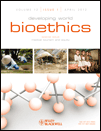
Developing World Bioethics
Scope & Guideline
Innovating solutions for complex health dilemmas.
Introduction
Aims and Scopes
- Cultural Contextualization of Bioethics:
The journal focuses on how cultural values and social norms influence ethical considerations in health and medical practices, particularly in the Global South. - Ethical Implications of Health Policies:
It examines the ethical dimensions of health policies and practices in developing countries, addressing issues such as access to care, resource allocation, and public health ethics. - Informed Consent and Research Ethics:
A significant area of interest is the ethical complexities surrounding informed consent in research, especially in vulnerable populations and low-resource settings. - Interdisciplinary Approaches to Ethical Dilemmas:
The journal encourages interdisciplinary research that combines insights from philosophy, sociology, law, and medicine to address pressing bioethical challenges. - Focus on Marginalized Communities:
It highlights the ethical issues faced by marginalized groups, including women, children, and indigenous populations, advocating for justice and equity in health care. - Global Health Challenges and Solutions:
The journal engages with global health challenges, exploring ethical frameworks for addressing issues like pandemics, resource scarcity, and health inequities.
Trending and Emerging
- Impact of Pandemics on Bioethics:
There is a significant focus on the ethical implications of pandemics, particularly COVID-19, exploring topics such as vaccine distribution, resource allocation, and ethical challenges in public health responses. - Cultural Approaches to Reproductive Health:
Emerging discussions around reproductive health ethics, including abortion and assisted reproductive technologies, are gaining traction, emphasizing culturally sensitive approaches and justice. - Ethics of Emerging Technologies:
The journal is increasingly addressing ethical issues related to new technologies in healthcare, such as AI in medicine, genomics, and biobanking, particularly in the context of developing countries. - Community Engagement in Research:
A trend towards emphasizing community engagement and participatory approaches in health research is evident, highlighting the importance of local perspectives and involvement in ethical decision-making. - Human Rights and Health Equity:
A growing emphasis on the intersection of human rights and health equity is emerging, with discussions on how ethical frameworks can support justice and access to healthcare for marginalized populations.
Declining or Waning
- Traditional Bioethics Frameworks:
There seems to be a waning interest in conventional bioethics frameworks that do not incorporate local cultural perspectives, as the journal increasingly emphasizes context-specific ethical discourse. - Generalized Ethical Discussions:
Papers that discuss bioethics in a generalized manner without specific case studies or regional focus are becoming less frequent, as the journal prioritizes detailed analyses rooted in specific cultural and social contexts. - Western-Centric Ethical Models:
The use of Western-centric ethical models and theories is declining, with a shift towards more localized and culturally relevant ethical considerations. - Focus on Developed Nations' Issues:
There is a noticeable decrease in articles addressing bioethical issues primarily from developed nations, as the journal concentrates more on the unique challenges faced in developing regions.
Similar Journals

THEORETICAL MEDICINE AND BIOETHICS
Exploring the Frontiers of Medicine and Ethics.THEORETICAL MEDICINE AND BIOETHICS, published by SPRINGER, is an esteemed journal dedicated to exploring the complex intersections of medicine, ethics, and law. With its ISSN 1386-7415 and E-ISSN 1573-1200, this journal serves as a vital platform for scholars, practitioners, and students interested in the ethical implications of medical practices and innovations. Although it currently holds a Q4 impact factor in the categories of Issues, Ethics and Legal Aspects and Medicine (Miscellaneous) as of 2023, its relevance is amplified by its commitment to fostering critical discourse in a rapidly evolving field. The journal features a diverse range of articles that address profound ethical dilemmas in healthcare, making it a significant resource for contemporary research from 1997 to the present. As an open-access journal, it ensures that cutting-edge knowledge is readily available, inviting contributions that challenge conventional thought and advance the field of bioethics.

AMERICAN JOURNAL OF BIOETHICS
Elevating bioethical standards in health and medicine.American Journal of Bioethics (ISSN: 1526-5161, E-ISSN: 1536-0075) is a premier publication in the field of bioethics, published by Routledge Journals, Taylor & Francis Ltd, renowned for its commitment to advancing scholarly discourse. Established in 2001, the journal is positioned at the forefront of ethical discussions in healthcare, evidenced by its impressive Q1 rankings in both Health Policy and Issues, Ethics, and Legal Aspects in 2023. With an emphasis on high-impact research, it holds a prestigious Scopus Rank of #1/46 in Nursing and #9/310 in Medicine, showcasing its significance in shaping bioethical considerations. Though not classified as an open access journal, its contents are integral for researchers, practitioners, and students engaged in ethical policymaking and advocacy. By addressing contemporary ethical dilemmas and legal nuances within healthcare, the American Journal of Bioethics serves as an essential resource for fostering an informed dialogue and influencing policy development across the globe.
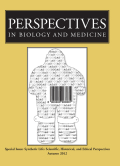
PERSPECTIVES IN BIOLOGY AND MEDICINE
Advancing Knowledge at the Biology-Medicine FrontierPERSPECTIVES IN BIOLOGY AND MEDICINE, published by the esteemed Johns Hopkins University Press, has been a cornerstone of interdisciplinary dialogue since its inception in 1957. With a rich history spanning over six decades, this journal delves into the multifaceted interactions between biology and medicine, offering insights that are vital for health policy, ethics, and the philosophy of science. Recognized for its impact, it holds a Q2 ranking in the History and Philosophy of Science category and Q3 rankings in several other relevant fields as of 2023. While not an open-access publication, it provides critical analyses and discussions that are indispensable for researchers, professionals, and students alike. With its committed editorial team, PERSPECTIVES IN BIOLOGY AND MEDICINE continues to foster scholarly engagement and is poised to shape the future discourse in the biosciences.

New Bioethics-A Multidisciplinary Journal of Biotechnology and the Body
Navigating the Complexities of Body and BioethicsNew Bioethics: A Multidisciplinary Journal of Biotechnology and the Body, published by Taylor & Francis Ltd, serves as a pivotal platform for scholarly discourse at the intersection of biotechnology, health policy, and bioethics. With an ISSN of 2050-2877 and E-ISSN 2050-2885, this journal has been contributing to the academic community since its establishment in 2012 and is set to continue through 2024. It holds notable rankings in prestigious fields, including Q4 in Genetics (clinical), Q3 in Health Policy, Q2 in Issues, Ethics and Legal Aspects, and Q3 in Reproductive Medicine as per 2023 quartile indicators. Although no open access model is available, the journal remains an essential resource for those interested in the ethical implications of biotechnological advancements. Its focus on the ethical, legal, and social dimensions of biotechnology is particularly relevant in today's rapidly evolving scientific landscape, making it invaluable for researchers, professionals, and students keen to explore the complexities surrounding the biotechnology and the human condition.
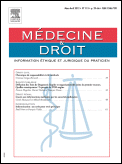
Medecine & Droit
Transforming Medical Practice Through Legal PerspectivesMedecine & Droit, an esteemed journal published by ELSEVIER MASSON, CORP OFF, serves as a vital resource for the intersection of law and medicine. Since its inception in 1995, this journal has facilitated scholarly discourse by publishing innovative research, case studies, and reviews that explore the complexities of legal frameworks impacting medical practice and public health. Although currently classified in the fourth quartile within both the Law and Medicine (miscellaneous) categories for 2023, its contributions are important for legal professionals and healthcare providers seeking to navigate the evolving landscape of medical laws. With an ISSN of 1246-7391 and E-ISSN 1873-6475, it provides essential insights and stimulates interdisciplinary collaboration within academia. Authors and researchers are encouraged to contribute and engage with critical topics shaping the future of medicine and law through this essential publication.
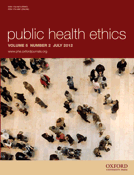
Public Health Ethics
Navigating the Ethical Landscape of Public HealthPublic Health Ethics is a key journal published by Oxford University Press, dedicated to the intersection of public health, ethics, and policy. With an ISSN of 1754-9973 and an E-ISSN of 1754-9981, this journal has been a vital resource since its inception in 2009 and continues to contribute to the discourse until 2024. As a Q3 journal, it holds ranks of #17/46 in 'Nursing - Issues, Ethics and Legal Aspects' and #146/310 in 'Medicine - Health Policy' according to Scopus, reflecting its significance within the research community. The journal aims to address urgent questions and ethical dilemmas faced in public health practice and policy, making it essential reading for researchers, professionals, and students interested in health policy, ethics, and legal implications impacting public health. The absence of open access underlines the journal’s commitment to maintaining high standards of peer-reviewed research, encouraging rigorous scholarship that fosters innovative solutions to pressing public health challenges.
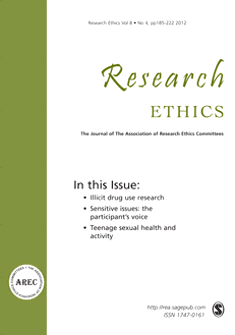
Research Ethics
Transforming Ethical Challenges into Scholarly Dialogue.Research Ethics is a leading journal published by SAGE Publications Inc that fosters scholarly discourse at the intersection of ethical considerations and research practices. As an Open Access platform since 2018, it ensures that critical insights on ethical dilemmas faced by researchers are freely available to a global audience, significantly enhancing its reach and impact. With an impressive impact factor reflected in its Q1 and Q2 rankings in Philosophy and Education respectively for 2023, this journal occupies a vital space for researchers and professionals aiming to navigate the complex ethical landscape of contemporary research. As indicated by its strong Scopus rankings, falling into the 95th percentile in Arts and Humanities (Philosophy) and 77th percentile in Social Sciences (Education), Research Ethics is essential for anyone interested in contributing to or understanding ethical practices in research. The journal encompasses a broad scope, encouraging submissions that explore diverse aspects of research ethics, promoting high standards and integrity across disciplines. Join a community dedicated to advancing ethical research methodologies and contributing meaningfully to the dialogue that shapes the future of moral practices in academia.

Medicine Health Care and Philosophy
Navigating the Complexities of Care and EthicsMedicine Health Care and Philosophy, published by SPRINGER, is an esteemed journal that bridges the disciplines of health care, philosophy, and social science. With an ISSN of 1386-7423 and an E-ISSN of 1572-8633, this journal showcases interdisciplinary research that critically examines ethical, social, and philosophical issues in medicine and healthcare. With a significant impact factor and a status in the prestigious Q1 quartile for Philosophy and Q2 quartiles in both Education and Health Policy for the year 2023, it serves as a vital platform for scholars and practitioners to engage with the complex interplay of health and philosophy. The journal contributes to advancing knowledge and informing practice by publishing high-quality, peer-reviewed articles that promote scholarly dialogue across varied fields. As it converges towards 2024, Medicine Health Care and Philosophy remains dedicated to fostering a deeper understanding of health-related issues, making it an essential resource for researchers, professionals, and students committed to exploring the ethical dimensions of healthcare.
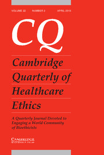
CAMBRIDGE QUARTERLY OF HEALTHCARE ETHICS
Illuminating Ethical Dilemmas in Health Systems.CAMBRIDGE QUARTERLY OF HEALTHCARE ETHICS is a premier journal published by Cambridge University Press, focusing on significant issues at the intersection of healthcare, ethics, and policy. With an ISSN of 0963-1801 and an E-ISSN of 1469-2147, this journal serves as a vital platform for discourse among researchers, practitioners, and scholars in the health social sciences. Emphasizing vital ethical considerations in healthcare practices and policies, it ranks in the Q3 tier for Health Policy and Q2 for both Health (Social Science) and Issues, Ethics, and Legal Aspects according to the 2023 journal category quartiles. The journal, spanning its tenure from 1992 to 2024, features rigorous peer-reviewed articles that contribute to the advancement of ethical standards in healthcare. By addressing contemporary ethical dilemmas and promoting scholarly dialogue, CAMBRIDGE QUARTERLY OF HEALTHCARE ETHICS remains an essential resource for those committed to understanding the complexities and ethical implications inherent in health systems today.

HEALTH CARE ANALYSIS
Illuminating the intersection of ethics and policy.HEALTH CARE ANALYSIS, published by SPRINGER, is a distinguished journal that has been contributing to the field of Health Policy and related disciplines since its inception in 1993. With a significant focus on the intricate issues, ethics, and legal aspects surrounding healthcare, this journal holds a prominent status reflected in its Q2 rankings across various categories, including Health Policy, Health (social science), and Issues, Ethics and Legal Aspects. As of 2023, it ranks in the top quartiles of its respective fields, indicating robust scholarly engagement and impact within the academic community. Although the journal is not open access, it remains accessible to a wide audience through institutional subscriptions, making it an essential resource for researchers, healthcare professionals, and policy-makers seeking to advance their understanding of complex healthcare systems and ethical considerations. Positioned in the Netherlands, HEALTH CARE ANALYSIS continues to drive critical dialogue and research, ensuring its relevance in shaping future healthcare policies and practices.